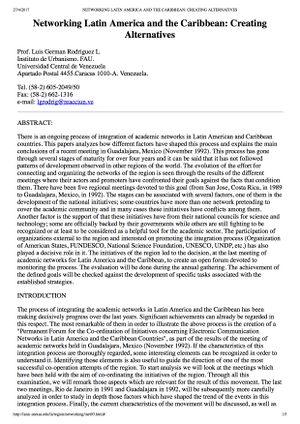Luis German Rodriguez L. (1992) Networking Latin America and the Caribbean: Creating Alternatives
Resumen
There is an ongoing process of integration of academic networks in Latin American and Caribbean countries. This papers analyzes how different factors have shaped this process and explains the main conclusions of a recent meeting in Guadalajara, Mexico (November 1992). This process has gone through several stages of maturity for over four years and it can be said that it has not followed patterns of development observed in other regions of the world. The evolution of the effort for connecting and organizing the networks of the region is seen through the results of the different meetings where their actors and promoters have confronted their goals against the facts that condition them. There have been five regional meetings devoted to this goal (from San Jose, Costa Rica, in 1989 to Guadalajara, Mexico, in 1992). The stages can be associated with several factors, one of them is the development of the national initiatives; some countries have more than one network pretending to cover the academic community and in many cases these initiatives have conflicts among them. Another factor is the support of that these initiatives have from their national councils for science and technology; some are officially backed by their governments while others are still fighting to be recognized or at least to be considered as a helpful tool for the academic sector. The participation of organizations external to the region and interested on promoting the integration process (Organization of American States, FUNDESCO, National Science Foundation, UNESCO, UNDP, etc.) has also played a decisive role in it. The initiatives of the region led to the decision, at the last meeting of academic networks for Latin America and the Caribbean, to create an open forum devoted to monitoring the process. The evaluation will be done during the annual gathering. The achievement of the defined goals will be checked against the development of specific tasks associated with the established strategies.
Archivo
Archivo:NETWORKING LATIN AMERICA AND THE CARIBBEAN CREATING ALTERNATIVES.pdf
Fuente
Latin American Network Information Center
Enlaces
URL: http://lanic.utexas.edu/la/region/networking/inet93.html#
Wayback Machine: https://web.archive.org/web/*/http://lanic.utexas.edu/la/region/networking/inet93.html#
